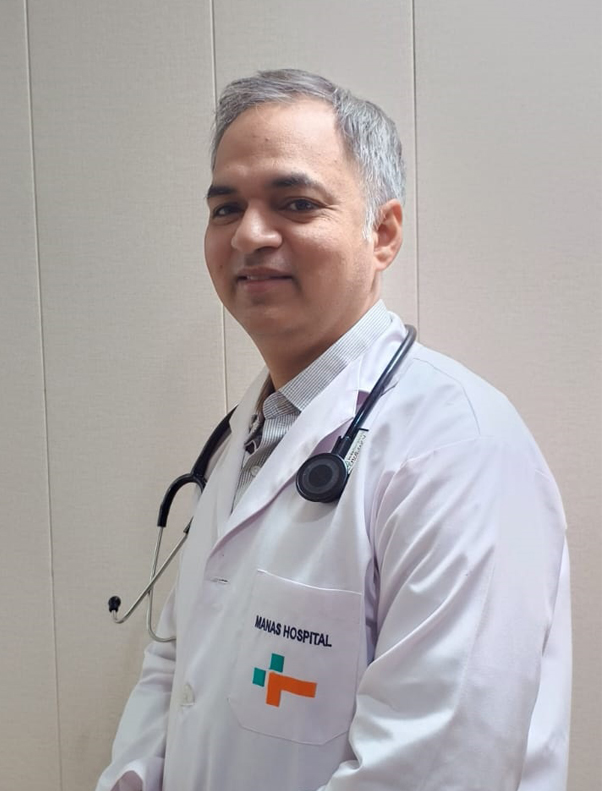
DM- Cardiology, Heart Specialist
MBBS, MD, DM- (Cardiologist), 15+ Years of Experience
At Manas Hospital, we are committed to providing comprehensive cardiovascular care with a focus on prevention, diagnosis, and management of heart diseases. Our Department of Non-Invasive Cardiology is equipped with state-of-the-art technology and staffed with experienced cardiologists dedicated to delivering exceptional care to our patients.
Our mission is to promote heart health and improve the quality of life for individuals at risk of or affected by cardiovascular diseases. We strive to offer advanced diagnostic services, expert consultation, and personalized treatment plans to meet the unique needs of each patient.
1. Diagnostic Testing: We offer a wide range of non-invasive diagnostic tests to evaluate heart health and detect various cardiac conditions. These tests include electrocardiography (ECG), echocardiography (echo), stress tests, Holter monitoring, and ambulatory blood pressure monitoring. Our advanced diagnostic services enable us to accurately assess heart function and identify abnormalities early on.
2. Risk Assessment: Our cardiologists provide comprehensive risk assessment services to evaluate the likelihood of cardiovascular disease development in patients. Through detailed medical history review, physical examination, and diagnostic testing, we assess individual risk factors such as hypertension, diabetes, obesity, smoking, and family history of heart disease. Based on the assessment, we develop personalized strategies to manage risk factors and prevent heart disease.
3. Consultation and Treatment: Our experienced cardiologists offer expert consultation and personalized treatment plans for patients with various cardiac conditions, including coronary artery disease, heart failure, arrhythmias, valvular heart disease, and congenital heart defects. We utilize evidence-based guidelines and innovative therapies to optimize patient outcomes and improve quality of life.
4. Cardiac Rehabilitation: We provide comprehensive cardiac rehabilitation programs to support patients recovering from heart-related procedures or events, such as heart surgery, angioplasty, or heart attack. Our multidisciplinary approach includes supervised exercise sessions, nutritional counseling, lifestyle modification education, and psychosocial support to help patients regain strength, improve cardiovascular health, and prevent future complications.
1. Expertise and Experience: Our Department of Non-Invasive Cardiology is led by a team of highly skilled cardiologists with extensive experience in diagnosing and treating a wide range of cardiac conditions. We are committed to providing expert care with compassion and professionalism.
2. State-of-the-Art Technology: We are equipped with advanced diagnostic equipment and technology to deliver accurate and timely assessments of heart health. Our state-of-the-art facilities enable us to perform a comprehensive range of non-invasive cardiac tests with precision and reliability.
3. Compassionate Care: We understand the importance of compassionate and patient-centered care in managing cardiovascular diseases. Our team is dedicated to building trust, establishing open communication, and providing support to our patients and their families throughout their cardiac care journey.
4. Collaborative Approach: We believe in a collaborative approach to cardiac care, involving close coordination with other medical specialties, including cardiovascular surgery, interventional cardiology, electrophysiology, and cardiac rehabilitation. By working together as a team, we ensure seamless continuity of care and comprehensive management of our patients’ cardiac health.
If you are seeking expert cardiac care in Noida, we invite you to schedule an appointment with our Department of Non-Invasive Cardiology at Manas Hospital. Our dedicated team of cardiologists is here to provide you with compassionate, personalized care to help you achieve optimal heart health. Contact us today to book your consultation. We look forward to serving you!




Arrhythmia refers to any abnormality of the heartbeat, including too slow, too fast, and/or irregular. The most common symptom associated with an arrhythmia is palpitations or an awareness of the heartbeat. A more serious symptom is actual passing out (syncope). Evaluation of an arrhythmia usually includes some form of monitoring device. It is also very important to determine if the heart is structurally normal. How arrhythmias are managed is determined by the status of the heart structures and the extent of the
symptoms. The most advanced treatment includes pacemakers and defibrillators but medical therapy is frequently all that is necessary.
Stress testing is a method by which your heart can be examined for the possibility of coronary artery blockage. The test involves a progressive increase in workload under continuous electrocardiographic monitoring conditions. The test is carried out to a predetermined level based primarily on heart rate. Frequently, stress testing is performed in conjunction with echocardiography or nuclear scanning of the heart muscle. These methods increase our ability to make an appropriate and correct diagnosis. The test is usually performed in patients who have symptoms or in whom there is a strong suspicion of the possibility of coronary artery disease, such as individuals with multiple risk factors.
Cholesterol is a fatty substance in the blood which is deposited within the arteries, producing progressive obstruction to many different organs,particularly the heart. Cholesterol has two components, HDL (good) and LDL (bad). The total numbers and the relationship of these components determine their predisposition to the development of plaques within the arteries to your heart. Triglycerides are another fat which exists within your body and their elevation can result in the formation of the worst type of cholesterol and fat particles. A lipid profile allows us to examine all of these components in detail.
An echocardiogram is a study which uses reflected sound waves to reconstruct the heart and all of its valves. It is usually performed with a probe through the chest wall but under special circumstances, the information can also be obtained using a probe which is passed down the oesophagus,positioning it very close to the heart. Using the reflected sound waves, the chambers of your heart can be analysed in terms of size and function. With the addition of Doppler techniques, very precise information can also be obtained about the valves of the heart. Echocardiography is also frequently used in conjunction with stress testing to allow the analysis of heart function at rest and in response to stress, usually exercise.
A stroke is death of brain tissue due to either bleeding into the brain or interruption of blood flow to an area of the brain. In adults, the most common cause of stroke is the interruption of blood flow. This can occur in situ at the location of the stroke within the brain due to vascular disease or it can be a result of the passage or embolization of particulate matter from arteries in the neck, the large aorta within the chest, or the heart itself. This particular matter can be clotted blood or fragmented bits of cholesterol. Stroke is the most common complication related to longstanding, poorly controlled high blood pressure or hypertension.

Never thought Manas Hospital could be such a support in my bad times. Got a fractured leg treated here. Thank you for all the support.

Thank you for saving my mother’s life. Highly recommended for emergencies near city centre area, Noida

Best Hospital, very affordable, patient centric, Dr.Naman is very good. Highly recommended for any kind of General Diseases and Maternity and Child Care. Thank you for all the support!